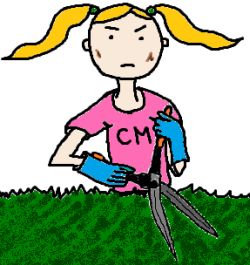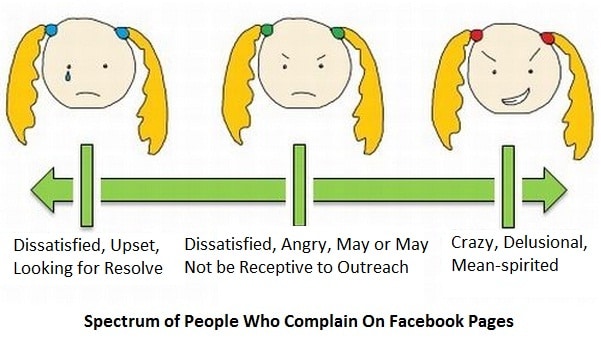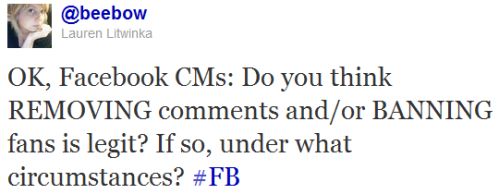
Wait, hang on a sec. Before we start talking about weeding user-generated content and uprooting Facebook fans forever, let’s set the record straight. It’s mantra time, fellow CMs. Ready?
Repeat After Me: Not All Negativity Is Bad
That’s right. Under most circumstances, I am a firm believer in not removing comments simply because they are negative in nature. Facebook Pages are created to give brands an online presence in a bounteous social community. If Facebook pages represent brands, by extension, they represent the products, services, or causes provided by those brands. And if consumerism has taught us anything over the last century, it’s that not every brand experience is a positive one.
Guess what? That’s okay! That’s normal.
It’s unrealistic to assume you can please every customer, every time, and vanquish very human sentiments such as disappointment or frustration from the commercial universe. Consumer complaints have been around since the dawn of consumerism.
The thing that gives companies a different kind of willies now is that these complaints aren’t happening over the phone or during afternoon tea for two. They’re happening online, for millions of eyeballs to see. Top that, they’re happening on branded assets (i.e. Facebook Pages), places some companies believe to be sacred temples for positive engagement.
Negative reviews, accounts of poor brand experiences, and consumer complaints in general are not the worst thing to have on your Facebook wall. Why?
- They bring the issue to your attention. Now that you know about it, you can address it!
- They indicate the customer wants resolution. After all, he/she took the time to go to your page to vent.
- They provide an opportunity for your to turn a complainer into an evangelist.
- They make your brand seem… human. Negative reviews can emphasize the legitimacy of positive ones.
- They serve as honest feedback to a community who deserves it: existing and potential customers.
- They can encourage satisfied customers to come to your aide, defending your brand with positive experiences of their own.
In summation, don’t remove comments simply because they are negative.
Okay. Now onto the juicy stuff.
Negative comments can come from let-down customers. They can also come from total wackjobs. Sometimes, they’re aimed at the brand. Other times, fellow community members. It’s important to be able to distinguish a legit complaint from straight up harassment. In the last installment of this series, we explored the Spectrum of People who Complain on Facebook.
Once you discern the nature of the complaint, it’s time to decide what to do about it.
(Tip: Establishing house rules for your Facebook community will totally help with what’s to come. Once you have the rules in place for all the world [wide web] to see, understanding whether a comment/fan should be removed is way more obvious. They either crossed the line, or they didn’t.)
When Do You Remove Comments?
What makes a comment snip-worthy? The definitive threshold should be established on a brand-by-brand basis, taking into account the nature / demographics of the community. Facebook comments containing mild profanity or racy verbiage might be totally okay for Energy Drink Brand X, but not so much for Family Owned Restaurant Z.
There are, however, some general warning signs it might be time to trim the thread, like if the comment(s) contain(s)…
- Baseless accusations, as in… “You cheated me! You rigged that promotional contest! Your company is corrupt! You are conspiring against me!”
- Libel content, as in… “Your product killed my sister!” … despite the fact that sister is alive… and also leaving angry comments on your page.
- Profanity, as in… “You motherf@#$%^&* bi@&$#@ little &*#$*&# I swear *@&$(#!”
- Hate speech, as in… “You’re all a bunch of [insulting term relating to race, creed, orientation, etc.].”
- Reverse hate speech, as in… “You fouled up my order because I’m [sexual orientation], didn’t you!? I didn’t win because I’m [ethnicity], right??!!”
- Harassment, as in… any of the above, on a recurring basis. This goes for harassment against the community manager as well as fellow community members.
When Do You Ban A Fan?
Banning fans can make for a stickier situation than simply removing comments. As such, it’s something to be thought about carefully. It’s a real statement to block someone from participating on your Facebook page. But sometimes, it’s necessary to ensure a safe, welcoming environment for your community.
There’s pretty much one clear warning sign to be watchful of when considering fan blockage.
- Fan refuses to acknowledge CM outreach, in tandem with repeated posting of libel allegations, hateful, racist, prejudice comments, and harassment.
If dude/dudette continues to sling invaluable, insulting, harmful content at your Facebook wall and the people who gather there, dude/dudette most likely falls on the far right of our spectrum. The crazy, delusional, mean-spirited side. It’s your right and responsibility to kick him/her out if you see fit.
- Do: C.Y.A.! Cover those assets. Document everything, screen-cap all questionable engagement as it happens.
- Do: Have faith in the support from loyal community members. They may rally around the assailant and kill him/her with kindness for you.
- Do not do: any removal of comments simply because they’re negative. You have to have a thick skin against legit negativity, and be ready to act.
- Do not do: any backing down from your House Rules. If someone’s breaking them, step in.
Bonus! Two Cents From Twitter
@AIMCLEAR & I took this to the tweet streets to get your two cents.
Pretty sure that last one’s a joke. *Crosses fingers*. Well folks, that about does it for this installment, fellow Community Managers. Next week, we’ll cruise through the Community Manger’s Crisis Playbook, featuring four potentially terrifying case studies and how to tackle them with grace and professionalism.
‘Til then, stay sane.











